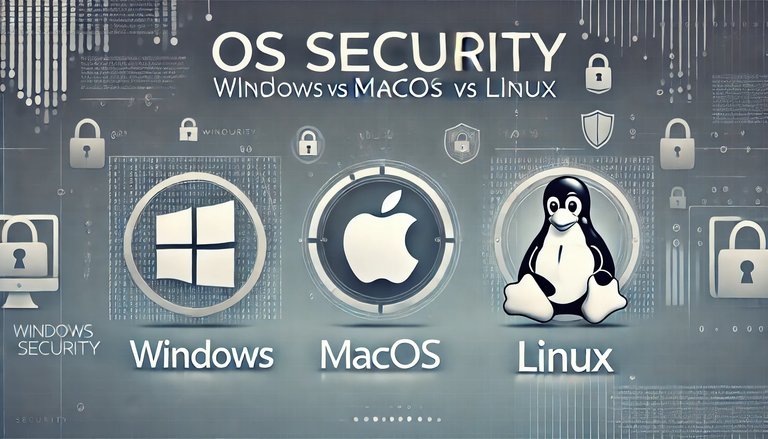In the past, Windows was widely considered less secure than Linux. But in an era of major advances in technology and cybersecurity, does this perception still hold? Let's explore how Windows has evolved, where macOS fits into the picture, and assess whether Linux is still the preferred choice for security today.

1. Windows Then and Now: Major Changes in Security
Originally, Windows was the most widely used operating system, making it a primary target for viruses and malware. However, Microsoft has introduced substantial security improvements in recent years, making Windows much more robust and competitive with both Linux and macOS.
The latest versions of Windows, such as Windows 10 and Windows 11, include advanced security tools and protections to counter today’s sophisticated threats. Let’s take a closer look.
2. New Windows Security Features
Windows Defender: Modern Windows includes Windows Defender, a built-in antivirus solution providing real-time protection, threat detection, and phishing protection. This tool has become highly competitive even with third-party antivirus solutions.
Frequent Security Updates: Microsoft regularly releases security patches, often weekly, quickly addressing vulnerabilities and keeping the system updated against the latest threats.
Sandboxing and Virtualization-Based Security (VBS): Windows uses advanced isolation techniques to protect sensitive system processes, reducing the risk of exploits.
BitLocker: Available to Windows users, BitLocker encrypts data stored on devices, providing robust data protection, especially for business and enterprise users.
3. macOS: Apple’s Approach to Security
Apple’s macOS also stands as a secure operating system, although with a different approach compared to Windows and Linux. Known for its closed ecosystem, macOS combines secure hardware with an integrated software environment. Here’s how it compares:
Sandboxed Applications: Like Linux and Windows, macOS uses sandboxing for apps, which limits the system resources apps can access, reducing the impact of any potential threats.
Gatekeeper and Notarization: macOS uses Gatekeeper, which verifies applications before they run, and notarization, a process where Apple scans and signs third-party apps for malware. These features provide an added layer of security by ensuring that most apps meet Apple’s standards before reaching users.
Tight Control Over Software Installation: Unlike Windows, where software can be freely downloaded from almost any source, Apple enforces strict control over software distribution. Most apps come from the App Store, which is curated and monitored, similar to Linux repositories. This mitigates the risk of installing malicious applications.
While macOS shares some security similarities with Linux (both use Unix-based architectures), Apple’s proprietary model means users rely on Apple for patches and system updates. This is unlike Linux’s open-source nature, where the community has visibility and control over code changes and updates.
4. Key Differences Between Windows, macOS, and Linux
Each system has unique advantages when it comes to security, largely influenced by design philosophies:
Linux’s Flexibility and Permissions: Linux’s open-source structure allows for extensive customization and strict permissions management, making it highly secure and often favored for servers. Windows and macOS have also introduced permission management (User Account Control in Windows and System Integrity Protection in macOS), but neither is as granular as Linux.
Windows’ Improvements and Compatibility: Windows has bridged many security gaps, offering significant protection for most users. However, Windows still remains a popular target for malware because of its large user base.
macOS’s Ecosystem Control: Apple’s closed ecosystem allows it to maintain high security standards but at the cost of user control and flexibility, which Linux offers in abundance.
5. Which System Is Right for You?
Today, choosing between Windows, macOS, and Linux is less about which is inherently “more secure” and more about the specific needs and preferences of the user:
Windows: A secure option for most everyday users, especially with recent security enhancements. Windows is a practical choice for both home users and businesses, given its wide compatibility.
macOS: Excellent for users who want a secure, well-integrated system and are already invested in Apple’s ecosystem. However, its closed nature means users must wait for Apple to provide security patches.
Linux: Still a top choice for users who need total control over their system and prioritize security, especially for servers and enterprise environments.
Ultimately, the choice between Windows, macOS, and Linux should consider not only security but also ease of use, compatibility, and specific user needs. And remember, whatever the operating system, staying secure also depends on following best practices: keeping systems updated, downloading software from trusted sources, and using strong, unique passwords.
See you next time 👋🏻😊
Do you have experience on Hive?
Feel free to leave your suggestions, I'm here to grow and improve.
New to Hive? Here is what I learned to have a good stay here: Thank you!
🔸Do not copy/paste & Do not spam & Do not flood
🔸Take your own photos or, if necessary, use the copyright-free ones
🔸Do not upvote your own posts and comments
🔸Interact with others & Do it in a meaningful way
Hello.
There is reasonable evidence that this article is machine-generated.
We would appreciate it if you could avoid publishing AI-generated content (full or partial texts, art, etc.).
Thank you.
Guide: AI-Generated Content = Not Original Content
If you believe this comment is in error, please contact us in #appeals in Discord.